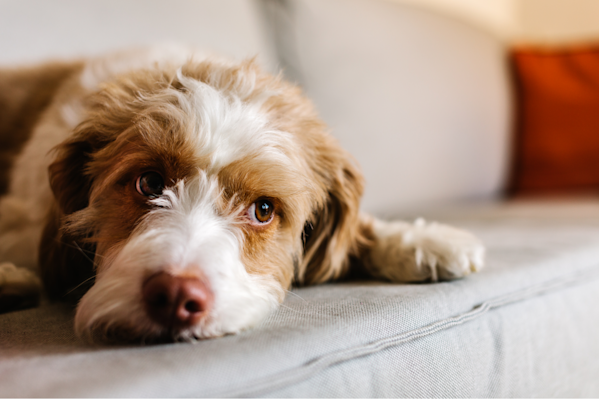Parvo or Canine Parvovirus (CPV) is one of the most common and contagious illnesses that can affect dogs. It's an important cause for gastrointestinal symptoms, especially in puppies.
In addition to understanding what parvovirus is, it's important to know the symptoms and treatments associated with this disease and how to prevent it.
What is parvovirus?
Canine Parvovirus is a highly contagious virus, and according to Dr. Yui Shapard, BVM&S, MRCVS and medical director at Pawp, it primarily affects young or unvaccinated dogs.
“Young dogs primarily affected are usually less than 6 months old, but any unvaccinated dogs can become infected,” Dr. Shapard explains.
Parvovirus is spread through direct contact between dogs, but can also be spread indirectly via contact with infected stools in the environment, on objects, and even by people that have come in contact with a contaminated pet or environment.
This virus can survive heat, cold, humidity, and drying, making it very difficult to control it in the environment. For this reason, most dogs will come into contact with it at some point.
Once a dog is infected, parvovirus attacks areas in the body where cells are dividing at a rapid rate. The most common areas that are affected in dogs are the gut and immune systems. Parvovirus destroys the cells in the intestinal tract while also suppressing the body’s ability to react to the infection via the immune system. The symptoms of parvovirus can take between 3-7 days after infection before it becomes apparent.
What are the symptoms of parvovirus?
Dr. Shapard says that the most common symptoms for dogs infected with CPV are diarrhea and vomiting. The diarrhea will often be bloody and can occasionally contain traces of mucous. These symptoms are often accompanied by depression, lethargy, or inappetence (lack of appetite).
If you see these symptoms in your dog, especially in young puppies and unvaccinated dogs, it's important to take them to the vet right away. Your vet can diagnose CPV quickly and efficiently by doing a clinical exam and some simple lab tests.
“CPV affects all dogs regardless of breed, but an increased risks were found in Rottweiler, Doberman Pinscher, Labrador Retriever, American Staffordshire Terrier, and Arctic sled breeds,” says Dr. Shapard.
How is parvovirus treated?
If your dog has been diagnosed with parvovirus, they will need intensive therapy and supportive care. It's very important to understand that there is no specific treatment to kill the virus (similar to viral infections in humans) and all treatment is aimed at supporting and maintaining essential body functions to allow the immune system a chance to fight the infection.
“Intravenous fluid therapy is the most common and one of the most important methods of treatment for dogs infected with CPV,” explains Dr. Shapard. This is because they can become severely dehydrated very quickly from losing fluids when they are vomiting and having diarrhea.
Additional supportive care will be recommended by your vet based on your dog’s symptoms and needs.
“This can include (but is not limited to) pain relief therapy, glucose and electrolytes therapy, anti-nausea and gastroprotectant therapy, antibiotics if secondary bacterial infection is suspected, protein-replacement therapy, appetite stimulants when indicated, and nutritional therapy,” says Dr. Shapard.
If your dog has CPV, they will likely need to be hospitalized, as intensive therapy in hospital greatly increases the survival rate.
How can parvovirus be prevented?
The good news is CPV can be prevented by vaccination. The parvo vaccine is considered a core vaccine and is a requirement according to the AAHA (American Animal Hospital Association).
Puppies should be vaccinated as early as six weeks of age and will need vaccines every two to four weeks until they reach 16 weeks old.
“It is important that the last vaccine be given at no younger than 16 weeks of age to avoid maternal antibody interference,” says Dr. Shapard.
When puppies nurse they get antibodies against diseases from the mom’s milk (maternal antibodies). This very often includes antibodies against parvo. Since there's no way to test every single puppy to see how many maternal antibodies are present, the vaccine regime is set up to start protecting puppies from the age when these maternal antibodies start to decrease and the puppies become vulnerable to disease. Some pups will have a higher number of maternal antibodies than others, and in that case, the puppy’s own immune system might not be adequately stimulated by the vaccine. This is why repeat vaccinations are so important in puppies—to make sure all pups have had adequate stimulation of their own immune system by the time all the vaccines have been given.
If your puppy comes home to you older than 16 weeks old and hasn’t been vaccinated, they will need two series of vaccinations for full immunity that lasts for about a year. From there, follow up boosters will be required, in accordance with your vet’s guidance.
Have questions about parvovirus? The team at Pawp is here 24/7—no wait time or appointment required.

Reviewed and fact-checked by
Dr. Mari, DVM at Pawp
